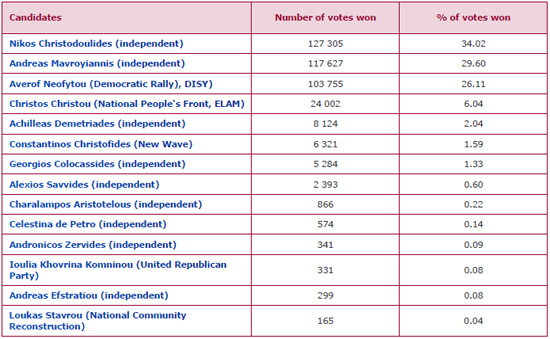Results
Elections in Europe
Corinne Deloy
-

Available versions :
EN

Corinne Deloy
As anticipated by the polls, former foreign minister (2018-2022) and former government spokesman (2013-2018) Nikos Christodoulides came out ahead in the first round of the presidential election on 5 February in Cyprus. The former member of the Democratic Rally (DISY), supported by the Democratic Party (DIKO), the Movement for Social Democracy (EDEK), the Solidarity Movement (DIPA) and who ran as an independent candidate, won 32.04% of the vote. He was ahead of Andreas Mavroyiannis, who won 29.60% of the vote. The second place won by this diplomat, former negotiator of the Greek Cypriot community on the issue of the partition of the island and permanent representative of Cyprus to the United Nations and the European Union, who ran as an independent but was supported by the Progressive Workers' Party (AKEL) and the left-wing formation Generation Change, is the surprise of this election. The two men will face each other in the second round of the presidential election on 12 February. Averof Neophytou, president of the Democratic Rally (DISY), came third with 26.11% of the vote. Christos Christou, president of the radical right-wing populist and nationalist party, the National Popular Front (ELAM), came 4th with 6.04% of the vote. The other 10 candidates each received under 2%. Almost three quarters of Cypriots went to the polls: the turnout rose to 72.05%. It was almost equivalent to that recorded in the first round of the previous presidential election on 28 January 2018 (+0.17 points). Of the 561,000 registered voters, 730 were Turkish Cypriots registered in the southern part of the island and 10,346 were Cypriots living abroad.
Results of the 1st round of the presidential election on 5 February 2023 in Cyprus
Turnout: 72.05%

Source : http://live.elections.moi.gov.cy/Greek/PRESIDENTIAL_ELECTIONS_2023/Islandwide Nikos Christodoulides positioned himself as a candidate capable of uniting Cypriots across party lines and bringing his compatriots together across ideological divides. He started his election campaign early, even though in a discreet way, long before his competitors. When the first results were announced, Nikos Christodoulides called for "unity" to "truly meet the expectations of the Cypriot people". "Cyprus has spoken clearly (...) I remain faithful to my desire for a government with a broad horizon. Our door is open to all those who share our concern for the future, for the world we will leave to our children. We are not excluding anyone. Although Nikos Christodoulides has broken with the Democratic Rally, opinion polls predicted that the independent candidate would receive about a third of the votes of his former party. So what will DISY decide to do in the second round? Some of its members blame Nikos Christodoulides for dividing the party by deciding to run for president on his own and presenting himself as an independent candidate while he was a member of the Democratic Rally, for which he was expelled in January. Andreas Mavroyiannis was able to convince people that he represented a promise of change after 10 years of Nicos Anastasiades' presidency. He benefited from the support of the well-organised and efficient Progressive Workers' Party which was able to mobilise its supporters. "This second place is explained by the fact that Andreas Mavroyiannis won the support of one party while Averof Neophytou failed to win it from the Democratic Rally," said Fiona Mullen, director of the Sapienta Economics Institute. Averof Neophytou suffered from the mistakes of the outgoing government, especially the "golden passport" scandal. The Cypriot authorities issued passports to thousands of foreign investors in exchange for a €2.5 million investment on the island (which could have involved the purchase of a residence). Launched in 2007, the Cyprus Investment Programme (CIP) grew especially after the economic crisis of 2013 when the country was on the verge of bankruptcy. According to the Ministry of the Interior, around 4,000 foreigners have benefited from this programme which has generated some €8 billion in revenue. The European Commission regularly denounces the lax attitude of certain states in controlling applicants and the lack of transparency in the granting procedures, the security risks that these procedures represent, and the opportunities for money laundering and tax evasion that they constitute. The so-called golden passport system was abolished on 1 November 2021. "Corruption is central to the debate, as is the economy and everyday life. The Cyprus problem (the division of the island) is a secondary issue," said Giorgos Kentas, professor at the University of Nicosia. Nikos Christodoulides, although a member of the outgoing majority, does not seem to have been affected by the scandal. "The explanation he has given seemed plausible to the population, he said he had no direct responsibility," said Andreas Theophanous, a political scientist at the Cyprus Center for European and International Affairs at the University of Nicosia. Nikos Christodoulides and Andreas Mavroyiannis will meet for a final televised debate on 9 February. The latest opinion polls forecast Nikos Christodoulides to win on 12 February ahead of Andreas Mavroyiannis with 58.30% of the vote against 41.70%.
On the same theme
To go further
Elections in Europe
Corinne Deloy
—
25 February 2025
Elections in Europe
Corinne Deloy
—
18 February 2025
Elections in Europe
Corinne Deloy
—
28 January 2025
Elections in Europe
Corinne Deloy
—
14 January 2025

The Letter
Schuman
European news of the week
Unique in its genre, with its 200,000 subscribers and its editions in 6 languages (French, English, German, Spanish, Polish and Ukrainian), it has brought to you, for 15 years, a summary of European news, more needed now than ever
Versions :



